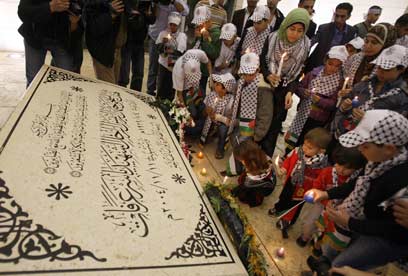
Experts exhume Arafat, seek evidence of poison
Switzerland hospital that carried out original tests on Arafat's clothes says results expected in several months
French magistrates opened a murder inquiry in August into Arafat's death in Paris after a Swiss institute said it had discovered high levels of radioactive polonium on his clothing, which was supplied by his widow, Suha.
Related Stories:
- Tunisian party to sue Israel over hit on abu-Jihad
- Report provides look into Gaza's smuggling network
- Peres to Ynet: Abbas, not Hamas, is the partner
Arafat died in Paris aged 75 in 2004 after a short, mysterious illness.
No autopsy was carried out at the time, at the request of Suha, and French doctors who treated him said they were unable to determine the cause of death.
But allegations of foul play immediately surfaced, with many locals pointing the finger at Israel, which confined Arafat to his West Bank headquarters in Ramallah for the final two and a half years of his life after a Palestinian uprising erupted.

Yasser Arafat tomb (Photo: AFP)
Israel has denied any wrongdoing, inviting the Palestinian leadership to release all his medical records, which were never made public following his death.
The official radio station Voice of Palestine reported that Arafat had been disinterred on Tuesday after work began at dawn.
"At 5:00 am (0300 GMT), experts began to remove the stones and began opening the grave in an orderly fashion. The remains were then transferred to a mosque adjacent to the grave for the removal of samples," a Palestinian source told AFP on condition of anonymity.
The source said only a Palestinian doctor would be allowed to directly touch the remains and remove the samples, but that the process was being conducted in front of Swiss, Russian and French experts.
Experts from Switzerland, France, Russia and the Palestinian territories took part in the exhumation, which was carried out far from the public gaze, behind blue sheeting carefully erected around his limestone mausoleum in Ramallah.
Workers strung up a huge Palestinian flag to cover the top of the city centre landmark, which lies inside the presidential compound of Arafat's successor, Mahmoud Abbas.

Arafat with Marwan Barghouti (Photo: AP)
"Samples will be taken according to a very strict protocol and these samples will be analyzed," said Darcy Christen, spokesman for the Lausanne University Hospital in Switzerland that carried out the original tests on Arafat's clothes.
"In order to do these analyses, to check, cross check and double cross check, it will take several months and I don't think we'll have anything tangible available before March or April next year," he added.
Jean-Rene Jourdain, deputy head of human protection at the French Institute for Radiological Protection and Nuclear Safety (IRSN), said it would take weeks of analysis to be sure that the traces were man-made polonium rather than just coincidental contamination by naturally-occurring polonium.
"Even if traces of polonium are found, it doesn't mean that they are man-made," he told AFP on Monday.
French investigators
Polonium, apparently ingested with food, was found to have caused the death of former Russian spy Alexander Litvinenko in London in 2006. But some experts have questioned whether Arafat could have died in this way, pointing to a brief recovery during his illness that they said was not consistent with radioactive poisoning. They also noted he did not lose all his hair.
Eight years is considered the limit to detect any traces of the fast-decaying polonium and the Lausanne hospital questioned in August if it would be worth seeking any samples if access to Arafat's body was delayed to "October or November."
Not all of Arafat's family has agreed to the exhumation and Suha herself has not come to Ramallah for the operation. Arafat's remains will be reburied with full military honors later on Tuesday after the forensic work is complete.
Working in parallel with the forensic team, French magistrates are also in Ramallah this week questioning members of Arafat's inner circle to see if they can shed light on his death.
One source told Reuters the French had a list of 60 questions, with at least one man facing five hours of grilling.
While many Palestinians believe that Israel was behind the death, they acknowledge that a Palestinian would almost certainly have had to administer the poison, wittingly or unwittingly.
Reuters and AFP contributed to this report
- Receive Ynetnews updates directly to your desktop










